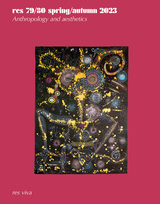23 start with R start with R

Positioning the events in the context of their time, Michael V. Metz delves into the lives and actions of activists at the center of the drama. A participant himself, Metz draws on interviews, archives, and newspaper records to show a movement born in demands for free speech, inspired by a movement for civil rights, and driven to the edge by a seemingly never-ending war. If the sudden burst of irrational violence baffled parents, administrators, and legislators, it seemed inevitable to students after years of official intransigence and disregard. Metz portrays campus protesters not as angry, militant extremists but as youthful citizens deeply engaged with grave moral issues, embodying the idealism, naiveté, and courage of a minority of a generation.
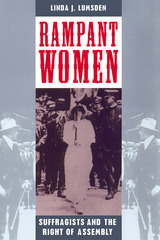
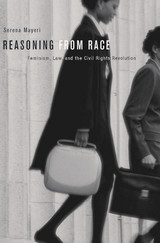
Informed in 1944 that she was “not of the sex” entitled to be admitted to Harvard Law School, African American activist Pauli Murray confronted the injustice she called “Jane Crow.” In the 1960s and 1970s, the analogies between sex and race discrimination pioneered by Murray became potent weapons in the battle for women’s rights, as feminists borrowed rhetoric and legal arguments from the civil rights movement. Serena Mayeri’s Reasoning from Race is the first book to explore the development and consequences of this key feminist strategy.
Mayeri uncovers the history of an often misunderstood connection at the heart of American antidiscrimination law. Her study details how a tumultuous political and legal climate transformed the links between race and sex equality, civil rights and feminism. Battles over employment discrimination, school segregation, reproductive freedom, affirmative action, and constitutional change reveal the promise and peril of reasoning from race—and offer a vivid picture of Pauli Murray, Ruth Bader Ginsburg, and others who defined feminists’ agenda.
Looking beneath the surface of Supreme Court opinions to the deliberations of feminist advocates, their opponents, and the legal decision makers who heard—or chose not to hear—their claims, Reasoning from Race showcases previously hidden struggles that continue to shape the scope and meaning of equality under the law.
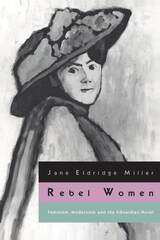
"Miller's is the best account we have, not only of Edwardian women novelists, but of early 20th-century women novelists; the measure of her achievement is that the distinction no longer seems workable." —David Trotter, The London Review of Books
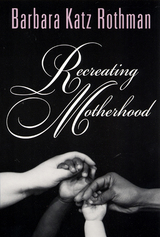
Selling “genetically gifted” human eggs on the free market for a hefty price. In vitro fertilization. Fetal rights. Prenatal diagnosis. Surrogacy. All are instances of biomedical and social “advancements” with which we have become familiar in recent years. Yet these issues are often regarded as distinct or only loosely related under the rubric of reproduction.
Barbara Katz Rothman demonstrates how they form a complex whole that demands of us in response a woman-centered, class-sensitive way of understanding motherhood. We need a social policy for dealing with mothers and motherhood that is consistent with feminist politics and feminist theory. Her book show how we as a society must first recognize that the real needs of mother, father, and children have been swept aside in an attempt to reduce the complex process of human reproduction to a clinical event that can be controlled by medical technology. Rothman suggests ways to accomplish social and legal change that would allow technological advances to affirm motherhood and the mother-child relationship without cost to women’s identity.
This new edition of Recreating Motherhood contains exciting updates. Rothman shows how this material is key in understanding the family, not just motherhood. And a new chapter, “Reflections on a Decade,” explores how new reproductive technologies combine with new marketing and new genetics to pose troubling social questions.
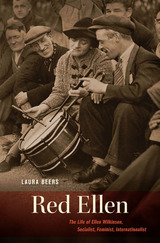
In 1908 Ellen Wilkinson, a fiery adolescent from a working-class family in Manchester, was “the only girl who talks in school debates.” By midcentury, Wilkinson had helped found Britain’s Communist Party, earned a seat in Parliament, and become a renowned advocate for the poor and dispossessed at home and abroad. She was one of the first female delegates to the United Nations, and she played a central role in Britain’s postwar Labour government. In Laura Beers’s account of Wilkinson’s remarkable life, we have a richly detailed portrait of a time when Left-leaning British men and women from a range of backgrounds sought to reshape domestic, imperial, and international affairs.
Wilkinson is best remembered as the leader of the Jarrow Crusade, the 300-mile march of two hundred unemployed shipwrights and steelworkers to petition the British government for assistance. But this was just one small part of Red Ellen’s larger transnational fight for social justice. She was involved in a range of campaigns, from the quest for official recognition of the Spanish Republican government, to the fight for Indian independence, to the effort to smuggle Jewish refugees out of Germany.
During Wilkinson’s lifetime, many British radicals viewed themselves as members of an international socialist community, and some, like her, became involved in socialist, feminist, and pacifist movements that spanned the globe. By focusing on the extent to which Wilkinson’s activism transcended Britain’s borders, Red Ellen adjusts our perception of the British Left in the early twentieth century.

A profound feminist Christian reframing of sexuality examines contemporary social practices and ethical sex
From the sexual abuse crisis in the Roman Catholic Church to the US Supreme Court decision outlawing state-level bans on same-sex marriage, it has become clear that Catholics and other Christians cannot afford to downplay sex or rely on outdated normative understandings of its moral contours. Feminist theological approaches offer a way forward by considering not just what we should do in sexual spheres but also what sort of sexual people we should aspire to be.
In Reenvisioning Sexual Ethics, author Karen Peterson-Iyer adopts a feminist Christian anthropological framework to connect robust theological and ethical analysis to practical sexual issues, particularly those confronting college-aged and younger adults today. The book examines four divergent yet overlapping contemporary social practices and phenomena wherein sex plays a central role: “hookup” culture; “sexting”; sex work; and sex trafficking. Through these case studies, Peterson-Iyer shows that ethical sex is best demarcated not as a matter of chastity on the one hand and purely free consent on the other, but rather as ideally expressing the fullness of human agency, communicating the joy of shared pleasure, and conferring a deep sense of possibility and wholeness upon all participants.
This feminist Christian framework will help facilitate frank and profound discussions of sex, enabling young adults to define themselves and others not by hypersexualized and gendered social norms or attitudes but by their fundamental status as dignified and beloved by God.
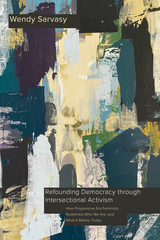
Sarvasy shows how these activists worked to incorporate women by combining political democracy with the creation of a welfare state. They embedded this nation-state project within a new humanitarian transnational level as they evolved their multileveled social citizenship.
Refounding Democracy through Intersectional Activism demonstrates how a theory-activist dynamic played out in experimental socializing spaces and democratic conversations. It offers an inspirational method for intersectional activists today.

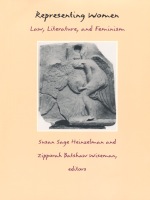
Beginning with an exploration of the ways in which women are represented—how they either tell or have their stories told in literature, in the law, in a courtroom—this collection demonstrates the interrelatedness of the legal and the literary. Whether considering the status of medieval women readers or assessing the effectiveness and extent of contemporary rape law reform, the essays show that power first comes with telling one’s own story, and that the degree and effect of that power are determined by the cultural significance of the forum in which the story is presented. But telling the story is not enough. One must also be aware of how the story is contained within traditional constructs or boundaries and is thus limited in its effects, as Carol Sanger’s essay on mothers and legal/sexual identity makes clear. One must also recognize how a story might perpetuate an ideological agenda that is not in the best interests of the storyteller, as Elizabeth Butler Cullingford shows in her reading of Yeats’s "Leda and the Swan" and one must know the historical context of a story and of its telling, as Anne B. Goldstein’s essay on lesbian narratives discloses.
Breaking down the boundaries between law and literature, this anthology makes evident the ways in which the effect of women’s stories has been constrained and expands the range of possibilities for those who represent women, tell women’s stories, or present women’s issues. Representing Women makes the retelling of old stories about women compelling and the telling of new ones both necessary and possible.
Contributors. Kathryn Abrams, Linda Brodkey, Rita Copeland, Elizabeth Butler Cullingford, Margaret Anne Doody, Susan B. Estrich, Michelle Fine, Anne B. Goldstein, Angela P. Harris, Susan Sage Heinzelman, Christine L. Krueger, Martha Minow, Carol Sanger, Judy Scales-Trent
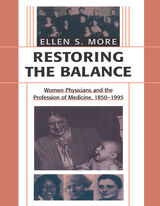
From about 1850, American women physicians won gradual acceptance from male colleagues and the general public, primarily as caregivers to women and children. By 1920, they represented approximately five percent of the profession. But within a decade, their niche in American medicine—women’s medical schools and medical societies, dispensaries for women and children, women’s hospitals, and settlement house clinics—had declined. The steady increase of women entering medical schools also halted, a trend not reversed until the 1960s. Yet, as women’s traditional niche in the profession disappeared, a vanguard of women doctors slowly opened new paths to professional advancement and public health advocacy.
Drawing on rich archival sources and her own extensive interviews with women physicians, Ellen More shows how the Victorian ideal of balance influenced the practice of healing for women doctors in America over the past 150 years. She argues that the history of women practitioners throughout the twentieth century fulfills the expectations constructed within the Victorian culture of professionalism. Restoring the Balance demonstrates that women doctors—collectively and individually—sought to balance the distinctive interests and culture of women against the claims of disinterestedness, scientific objectivity, and specialization of modern medical professionalism. That goal, More writes, reaffirmed by each generation, lies at the heart of her central question: what does it mean to be a woman physician?
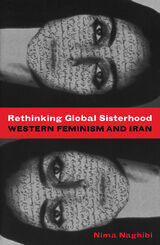
Western women’s involvement in Persia dates from the mid-nineteenth century, when female adventurers and missionaries first encountered their veiled Muslim “sisters.” Twentieth-century Western and state-sponsored Iranian feminists continued to use the image of the veiled woman as the embodiment of backwardness. Yet, following the 1979 revolution, indigenous Iranian feminists became more vocal in their resistance to this characterization.
In Rethinking Global Sisterhood, Nima Naghibi makes powerful connections among feminism, imperialism, and the discourses of global sisterhood. Naghibi investigates topics including the state-sponsored Women’s Organization of Iran and the involvement of feminists such as Betty Friedan and Gloria Steinem in the Iranian feminism movement before and during the 1979 revolution. With a potent analysis of cinema, she examines the veiled woman in the films of Tahmineh Milani, Ziba Mir-Hosseini and Kim Longinotto, and Mahnaz Afzali.
At a time when Western relations with the Muslim world are in crisis, Rethinking Global Sisterhood provides much-needed insights and explores the limitations and possibilities of cross-cultural feminist social and political interventions.
Nima Naghibi is assistant professor of English at Ryerson University in Toronto.
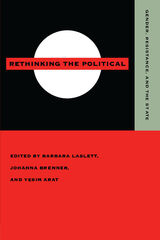
Section One, "Gender, Citizenship, and Collectivity," includes Nancy Frazer and Linda Gordon's critique of dependency and citizenship; Iris Young on women as a social collective; Ruth Bloch on the feminization of public virtue in revolutionary America; Trisha Franzen on feminism and lesbian community, and Sonia Kruks on de Beauvoir and contemporary feminism.
"Collective Action and Women's Resistance," Section Two, features Louis Tilly's "Paths of Proletarianization"; Temma Kaplan's "Female Consciousness and Collective Action"; and five assessments of women's collective action worldwide: Samira Haj on Palestine, Arlene McLeod on Egypt, Gay Seidman on South Africa, Nancy Sternbach et al. on Latin America, and Anne Walthall on Japan.
Concluding with a section on gender and the state, Rethinking the Political also features Bronwyn Winter on the law and cultural relativism; Sherene Razack on sexual violence; Wendy Luttrell on educational institutions; Patricia Stamp on ethnic conflict in postcolonial Kenya; Elizabeth Schmidt on patriarchy and capitalism in Zimbabwe; and Muriel Nazzari on the "woman question" in post-revolutionary Cuba.
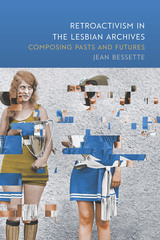
Grassroots historiography has been essential in shaping American sexual identities in the twentieth century. Retroactivism in the Lesbian Archives examines how lesbian collectives have employed “retroactivist” rhetorics to propel change in present identification and politics. By appropriating and composing versions of the past, these collectives question, challenge, deconstruct, and reinvent historical discourse itself to negotiate and contest lesbian identity.
Bessette considers a diverse array of primary sources, including grassroots newsletters, place-based archives, experimental documentary films, and digital video collections, to investigate how retroactivists have revised and replaced dominant accounts of lesbian deviance. Her analysis reveals inventive rhetorical strategies leveraged by these rhetors to belie the alienating, dispersing effects of discourses that painted women with same-sex desire as diseased and criminal. Focusing on the Daughters of Bilitis, the Lesbian Herstory Archives, and the June L. Mazer Archives, and on historiographic filmmakers such as Barbara Hammer and Cheryl Dunye, Bessette argues that these retroactivists composed versions of a queer past that challenged then-present oppressions, joined together provisional communities, and disrupted static definitions and associations of lesbian identity.
Retroactivism in the Lesbian Archives issues a challenge to feminist and queer scholars to acknowledge how historiographic rhetoric functions in defining and contesting identities and the historical forces that shape them.
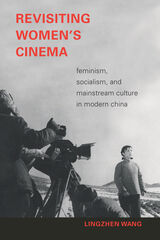
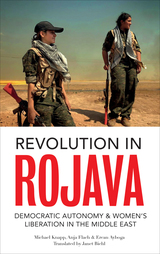
Revolution in Rojava tells the story of Rojava's groundbreaking experiment in what they call democratic confederalism, a communally organized democracy that is fiercely anti-capitalist and committed to female equality, while rejecting reactionary nationalist ideologies.
Rooted in the ideas of imprisoned Kurdish leader Abdullah Ocalan, the system is built on effective gender quotas, bottom-up democratic structures, far-sighted ecological policies, and a powerful militancy that has allowed the region to keep ISIS at bay.
Given the widespread violence and suffering in Syria, it's not unreasonable that outsiders look at the situation as unrelentingly awful. And while the reality of the devastation is undeniable, there is reason for hope in at least one small pocket of the nation: the cantons of Rojava in Syrian Kurdistan, where in the wake of war people are quietly building one of the most progressive societies in the world today. Chapters here include:
*Rojava's Diverse Cultures
*Democratic Confederalism
*The Liberation
*A Women's Revolution
*Democratic Autonomy in Rojava
*Civil Society Associations
*The Theory of the Rose: Defense
*The New Justice System
*Democratization of Education
*Health Care
*The Social Economy
*Ecological Challenges
This first full-length study of democratic developments in Rojava tells an extraordinary and powerfully hopeful story of a little-known battle for true freedom in dark times. With excellent first-hand background information about this important, but little understood struggle, Revolution in Rojava will educate and inspire the reader to learn more about Rojava, Syria, and the fight for change in one of the world’s most dangerous regions.
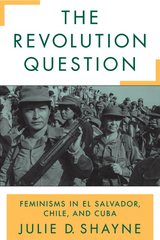
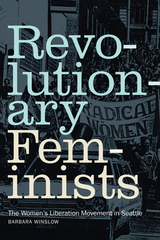
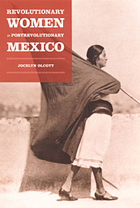
Olcott demonstrates an extraordinary grasp of the complexity of postrevolutionary Mexican politics, exploring the goals and outcomes of women’s organizing in Mexico City and the port city of Acapulco as well as in three rural locations: the southeastern state of Yucatán, the central state of Michoacán, and the northern region of the Comarca Lagunera. Combining the strengths of national and regional approaches, this comparative perspective sets in relief the specificities of citizenship as a lived experience.
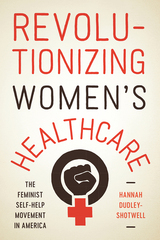
Revolutionizing Women’s Healthcare is the story of a feminist experiment: the self-help movement. This movement arose out of women’s frustration, anger, and fear for their health. Tired of visiting doctors who saw them as silly little girls, suffering shame when they asked for birth control, seeking abortions in back alleys, and holding little control over their own reproductive lives, women took action. Feminists created “self-help groups” where they examined each other’s bodies and read medical literature. They founded and ran clinics, wrote books, made movies, undertook nationwide tours, and raided and picketed offending medical institutions. Some performed their own abortions. Others swore off pharmaceuticals during menopause. Lesbian women found “at home” ways to get pregnant. Black women used self-help to talk about how systemic racism affected their health. Hannah Dudley-Shotwell engagingly chronicles these stories and more to showcase the creative ways women came together to do for themselves what the mainstream healthcare system refused to do.
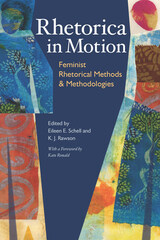
Rhetorica in Motion is the first collected work to investigate feminist rhetorical research methods in both contemporary and historical contexts. The contributors analyze the decision-making processes and methodologies employed in deciphering the origins, meanings, theories, workings, and manifestations of feminist rhetoric.
The volume examines familiar themes, such as archival, literary, and online research, but also looks to other areas of rhetoric, such as disability studies; gerontology/aging studies; Latina/o, queer, and transgender studies; performance studies; and transnational feminisms in both the United States and larger geopolitical spaces. Rhetorica in Motion incorporates previous views of feminist research, outlines a set of principles that guides current methods, and develops models for undertaking future inquiry, including working as individuals or balancing the dynamics of group research. The text explores how feminist research embodies what has come before and reflects what researchers, institutions, and instructors bring to it and what it brings to them. Underlying the discovery of this volume is the understanding that feminist rhetoric is in constant motion in a dynamic that resists definition.
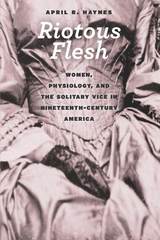
As April R. Haynes shows, the crusade against female masturbation was rooted in a generally shared agreement on some major points: that girls and women were as susceptible to masturbation as boys and men; that “self-abuse” was rooted in a lack of sexual information; and that sex education could empower women and girls to master their own bodies. Yet the groups who made this education their goal ranged widely, from “ultra” utopians and nascent feminists to black abolitionists. Riotous Flesh explains how and why diverse women came together to popularize, then institutionalize, the condemnation of masturbation, well before the advent of sexology or the professionalization of medicine.
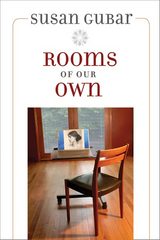
With a little help from Virginia Woolf, Susan Gubar contemplates startling transformations produced by the women's movement in recent decades. What advances have women made and what still needs to be done? Taking Woolf's classic A Room of One's Own as her guide, Gubar engages these questions by recounting one year in the life of an English professor.
A meditation on the teaching of literature and on the state of the humanities today, her chapters also provide a crash course on the challenges and changes in feminist intellectual history over the past several decades: the influence of post-structuralism and of critical race, postcolonial, and cultural studies scholarship; the stakes of queer theory and the institutionalization of women's studies; and the effects of globalism and bioengineering on conversations about gender, sex, and sexuality. Yet Rooms of Our Own eschews a scholarly approach. Instead, through narrative criticism it enlists a thoroughly contemporary cast of characters who tell us as much about the comedies and tragedies of campus life today as they do about the sometimes contentious but invariably liberating feminisms of our future.
READERS
Browse our collection.
PUBLISHERS
See BiblioVault's publisher services.
STUDENT SERVICES
Files for college accessibility offices.
UChicago Accessibility Resources
home | accessibility | search | about | contact us
BiblioVault ® 2001 - 2024
The University of Chicago Press




